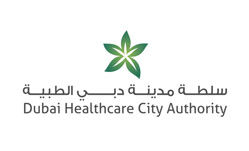
Thursday, Mar 29, 2012
Under the patronage of Chairperson of Dubai Healthcare City Authority (DHCA) Her Royal Highness Princess Haya Bint Al Hussein, wife of His Highness Sheikh Mohammed Bin Rashid Al Maktoum, Vice-President and Prime Minister of the UAE and Ruler of Dubai, Dubai Healthcare City (DHCC) and the Center for Science, Technology, and Security Policy (CSTSP) of the American Association for the Advancement of Science (AAAS) co-hosted the fourth edition of the CSTSP series of workshops organised in the Broader Middle East and North Africa (BMENA) region on life sciences, international collaboration and responsible science.
Under the patronage of Chairperson of Dubai Healthcare City Authority (DHCA) Her Royal Highness Princess Haya Bint Al Hussein, wife of His Highness Sheikh Mohammed Bin Rashid Al Maktoum, Vice-President and Prime Minister of the UAE and Ruler of Dubai, Dubai Healthcare City (DHCC) and the Center for Science, Technology, and Security Policy (CSTSP) of the American Association for the Advancement of Science (AAAS) co-hosted the fourth edition of the CSTSP series of workshops organised in the Broader Middle East and North Africa (BMENA) region on life sciences, international collaboration and responsible science.
Titled ‘International Engagement in Genetics and Epigenetics: Responsible Science for a Safe and Secure Society’, the highly interactive and discussion-based workshop brought together eminent life scientists from 16 countries to discuss ways on promoting responsible international collaboration in genetics and epigenetics between early-career scientists from BMENA countries and the US. In addition to examining ways for advancing biological sciences to help address national priorities, the two-day workshop held at Dubai Healthcare City discussed bioethics and biosafety.
Dr. Ayesha M. Abdullah, Managing Director of Dubai Healthcare City, Dr. Muhadditha Al Hashimi, CEO of Mohammed Bin Rashid Al Maktoum Academic Medical Center, Dr. Mona Mostafa Mohamed, Associate Professor, Head of Cancer Biology Research Laboratory, Faculty of Science, Cairo University, and other distinguished leaders from the life sciences landscape attended the event. In addition to the UAE, countries represented at the workshop included Afghanistan, Algeria, Egypt, Italy, Iraq, Jordan, Saudi Arabia, Kuwait, Lebanon, Morocco, Pakistan, Qatar, Tunisia, the US, and Yemen.
Professor Sehamuddin Galadari, Vice-Provost for Research and Graduate Studies, and Professor of
Biochemistry and Molecular Cell Biology at the UAE University and Head of DHCA’s Research and Education Committee, delivered the keynote speech. Dr Galadari is a member of the DHCA Board of Directors.
Dr Ayesha M. Abdullah, Managing Director of Dubai Healthcare City, said: “We are honoured that HRH Princess Haya granted her patronage to this workshop on bioscience and epigenetics, highlighting Dubai Healthcare City Authority’s strategic priorities of academia and research. The collaboration is aimed at creating a platform for young scientists from the BMENA countries and the US to address important scientific and societal issues, develop a programme on conducting responsible research at the institutional level, and provide opportunities for career development and peer mentorship.
The agenda is aligned with DHCA’s vision to foster research in Dubai, the UAE and the region, and the outcomes will therefore assist us in benchmarking against international best practices in the scientific discipline.”
Dr. Norman Neureiter, Acting Director, Center for Science, Technology & Security Policy, American Association for the Advancement of Science, said: “The workshop focused on the young and early career scientists. Not only did past meeting participants suggest that we engage the future generation of leading scientists but, in collaboration with Dubai Healthcare City, we went further to include them in the agenda and asked them to share their experience and perspectives as young scientists on key issues in the life sciences space such as bioethics and biosafety.”
The workshop also highlighted the need for cutting-edge genetic and epigenetic research, and inculcating an understanding of legal, ethical and security concerns among life scientists. Building sustainable long-term international collaborations among life scientists from the Middle East, North Africa, Afghanistan, Pakistan and the US was also underscored.
The fourth workshop is part of a series hosted by the AAAS’s Center for Science, Technology, and Security Policy. The earlier workshops were held in collaboration with the Jordan University of Science and Technology (JUST) Princess Haya Biotechnology in October 2010 and the Kuwait Institute for Scientific Research (KISR) in March 2011, while the third edition was hosted in collaboration with the Institut Pasteur de Tunis in Tunisia in October-November 2011.
